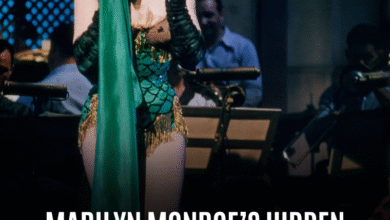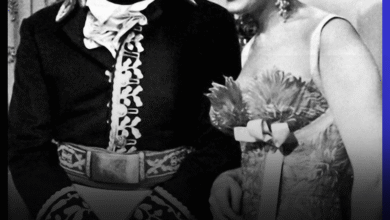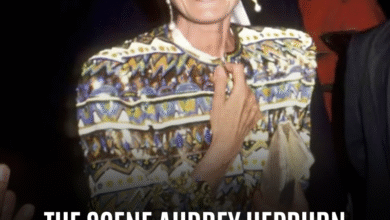How Audrey Hepburn’s Father Left Her Heartbroken in 1964—And Why She Still Supported Him Despite It!
OPINION: This article may contain commentary which reflects the author's opinion.
Audrey Hepburn, a name synonymous with grace, talent, and humanitarianism, is remembered not only for her groundbreaking roles in Breakfast at Tiffany’s and My Fair Lady, but also for the deeply personal experiences that shaped her as a woman. Among the most poignant chapters of her life was her relationship with her estranged father, Joseph Hepburn-Ruston, which had a lasting emotional impact on the star. One of the most significant moments in their strained relationship occurred in 1964, when Hepburn attempted a reunion with her father after nearly three decades of separation. However, the meeting turned out to be far less fulfilling than she had hoped.
The Background: A Father’s Absence and Emotional Trauma
Audrey Hepburn’s early life was marked by the absence of her father, who abandoned the family when she was just six years old. Joseph Hepburn-Ruston, a British man with strong fascist leanings, was known for his support of Adolf Hitler and involvement with the British Union of Fascists. This political stance led to his departure from the family in 1935, just before the outbreak of World War II. Audrey was left with her mother, Baroness Ella van Heemstra, in Brussels, and the emotional void created by her father’s abandonment remained a significant trauma throughout her life.
Hepburn herself described her father’s departure as “one of the great traumas of my life,” a sentiment echoed by her son and granddaughter in various documentaries. During the war, Joseph was detained on the Isle of Man due to his fascist activities but later relocated to Dublin, Ireland, where he worked in insurance and married Fidelma Walshe. Despite his controversial past, he managed to cultivate social connections with prominent figures, including the Guinness family and Sir Alfred Beit, a well-known art collector and philanthropist.
The 1964 Reunion: A Disappointment
By 1964, Hepburn had established herself as an international film icon, but the absence of her father still haunted her. Hoping to repair the broken relationship, her husband at the time, actor Mel Ferrer, took the initiative to track down Joseph using the Red Cross. The reunion was set to take place in Dublin at the Shelbourne Hotel, a significant venue near Joseph’s residence in Merrion Square. Photographs from the meeting show Audrey approaching her father, who appeared detached and indifferent.
The reunion, which occurred in August 1964, did not live up to Hepburn’s expectations. Joseph’s response was described as curt and emotionally distant, with reports indicating that Audrey had to initiate any physical contact, including a hug. This coldness left her devastated, as she had hoped for a reconciliation that would provide closure and understanding. The emotional toll of this encounter led to Audrey’s realization that her father, the man she had longed to reconnect with, was now an unrecognizable figure.
Financial Support and Continued Compassion
Despite the emotional devastation from their reunion, Audrey Hepburn’s sense of duty and compassion prevailed. She continued to provide financial support to her father in the years that followed, demonstrating her unwavering kindness, despite the lack of emotional closeness between them. This support extended through his later years, with Audrey visiting him in Switzerland and traveling to Dublin in 1980 when he was gravely ill.
However, Joseph passed away in 1980 at Baggot Street Hospital in Dublin. Audrey chose not to attend his funeral, citing a fear of a media circus, a decision that highlighted her desire for privacy and a sense of closure on her terms. Her financial support, however, stood as a testament to her character and her willingness to help her father, even in the face of years of emotional abandonment.
Cultural Impact and Legacy
Audrey Hepburn’s reunion with her father remains a poignant and complex moment in her life, often discussed in documentaries and books about her personal journey. The 1964 meeting, though marked by disappointment, was also a sign of Hepburn’s enduring grace and strength. She continued to support her father despite the emotional scars left by his abandonment, embodying a sense of forgiveness and selflessness that defined her later life and work as a humanitarian.
The emotional depth of Hepburn’s story, as revealed through her relationship with her father, offers a deeper understanding of the personal struggles that shaped her both on and off-screen. Her willingness to continue supporting him despite the painful past speaks to her resilience and the complexities of family relationships.
Conclusion: A Complex Legacy of Love and Forgiveness
Audrey Hepburn’s attempt to reconnect with her father in 1964 remains one of the most significant and emotional chapters of her life. The reunion, though emotionally painful, illustrates the complexity of their relationship and Hepburn’s deep desire for closure. Despite her father’s coldness, Audrey’s compassion never wavered, and she continued to support him until his death. This act of forgiveness and strength is part of the legacy Hepburn left behind, demonstrating that even in the face of great personal challenges, her character remained grounded in love and compassion.



